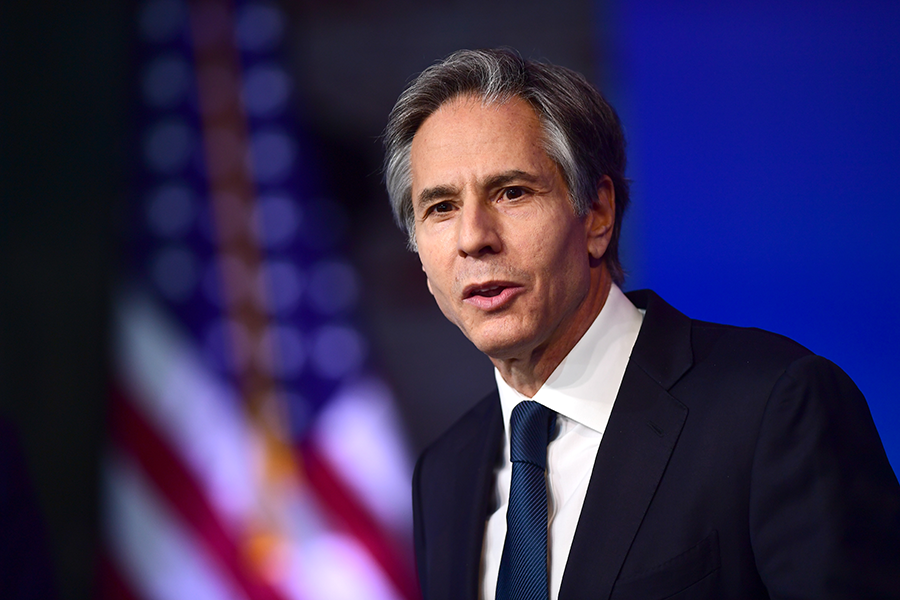Stepping Back from Unilateralism
January/February 2021
By Antony Blinken
The world that Vice President Biden would be inheriting goes a long way to telling you the direction of the foreign policy we pursue in office. We are facing the most challenging and complex international landscape and international security landscape, certainly in decades, if not longer.
 Having said that, Biden certainly believes it’s within our considerable capacity, America’s considerable capacity, to shape things, at least on the margins, for a better future where our security, our prosperity, and our values are enhanced, not diminished. That’s kind of the big picture that we’re facing. Even in all of this change, there are certain constants; let me just briefly mention those, and we can get into more specifics.
Having said that, Biden certainly believes it’s within our considerable capacity, America’s considerable capacity, to shape things, at least on the margins, for a better future where our security, our prosperity, and our values are enhanced, not diminished. That’s kind of the big picture that we’re facing. Even in all of this change, there are certain constants; let me just briefly mention those, and we can get into more specifics.
First, whether we like it or not, the world tends not to organize itself. There is a premium still, and in some ways even more than before, on American engagement, on American leadership, because basically we have a choice. If we’re not doing a lot of that organizing in terms of shaping the rules and the norms and the institutions through which countries relate to one another, then one of two things: either someone else is doing it and probably not in a way that advances our own interests and values, or maybe just as bad, no one is, and then you tend to have chaos and a vacuum that may be filled by bad things before good things. There’s a premium, I think Biden believes, on American engagement, on American leadership.
Second, and again no less important for being obvious, there’s also a premium on finding ways and probably new ways to cooperate among nations and among different stakeholders because, simply put, the big problems that we face as a country and as a planet, whether it’s climate change, whether it’s a pandemic, whether it’s the spread of bad weapons—to state the obvious, none of these have unilateral solutions. Even a country as powerful as the United States can’t handle them alone. There’s no wall high enough or thick enough to ward them off.
Add to that, a crisis in the credibility of institutions, hyperpartisanship, corruption permeating our systems in different ways—it makes for an incredibly challenging time.
To address one specific issue—Iran—we have a problem that President Donald Trump has turned into a much bigger one, a much deeper one and potentially into a crisis. The president did two things: He tore up the Joint Comprehensive Plan of Action (JCPOA), the nuclear agreement with Iran, and he said it would lead to and compel Iran to negotiate a better agreement. He also instituted a campaign of so-called maximum pressure that he said would curb Iran’s provocative actions in the region.
In fact, exactly the opposite has happened, as many predicted at the time. Far from leading to a better agreement, the unraveling of the JCPOA, because of the actions of the Trump administration, has now put us in a place where, one, we’re isolated from our partners who negotiated the agreement with us and, two and much more importantly even, Iran is restarting dangerous components of this program and putting itself in a position where it is closer to a capacity to develop a solid material for a nuclear weapon on short order than it was when we left office.
There is, as far as I can tell, no strategy, no plan on the part of this administration to do anything about this. We’re heading right back to where we were before the agreement, which is a really terrible binary choice between either taking action to stop the program [and] all of the potential unintended consequences of doing that or doing nothing and allowing Iran to be in a breakout position where it can develop a nuclear weapon on very, very short order.
The most fundamental challenge for us and problem for us in terms of our own interest is, in the first instance, dealing with Iran’s nuclear program. That’s what the JCPOA was about. If Iran comes back into compliance with its obligations, Biden said, “[w]e should too, and we would too,” having brought the allies back on our side. But [right] now they keep asserting an equivalence between Iran and the United States, pretty extraordinary, asking us both to calm down.
With our partners and allies back on our side, with the agreement, once again, enforced, we can use that as a platform to try to build a stronger and longer agreement. With the allies with us again, we’re in a much better position jointly to confront Iran’s actions and provocations that we don’t like.
Right now, most of our partners are spending all of their time trying to figure out how to keep the nuclear agreement alive, not working with us to deal with Iran’s excesses in the region.
